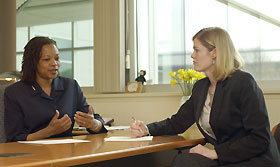For more archives, go to the Advance Archive/Search Page.
Career Services Welcomes New
Liaison For Graduate Students
Jan Jones has seen the career services dance from both sides of the desk. As a graduate student at UConn, she wondered how to put her degree to work; whether to go for a job in academia or the corporate world; how to make a better presentation during an interview; and a dozen other details.
 |
Cynthia Jones, left, director of career services, speaks with Jan Jones, the new career liaison for graduate students. They hope to increase awareness of the services the department provides for graduate students.
Photo by Dollie Harvey
|
But she also had the benefit of doing an internship and working in UConn's Department of Career Services during her five years of graduate school. So she knew some of the steps job applicants must take to land the perfect job.
Last year Jones, who earned her Ph.D. in education in May 2003, realized she already had the perfect job - helping other graduate students plot their careers. Last month, she became a permanent member of the career services team, when she was appointed to the role of graduate student liaison and special projects coordinator.
"A lot of what we do here impacts graduate students, but they usually assume our programs are not for them because our material doesn't specifically mention graduate students," says Jones. "Graduate students really don't know what we do. They're just trying to survive their thesis or dissertation. So we have to reach out to them."
That's a role that Jones is well equipped to fill. While earning a master's degree in tourism from Acadia University in Nova Scotia, Canada, she learned about special events programming, promotions, and producing effective newsletters. Today, the Internet provides more communications opportunities, and with the advent of PeopleSoft, more students - graduates as well as undergraduates - must regularly check their Husky Mail account.
"I've announced the last few lunchtime seminars on the graduate student listserv, and the numbers have picked up nicely," she says, "from 10 or 12 students last year, to 27 to 30 for the last two."
Cynthia F. Jones, director of career services - another member of staff with the surname Jones in career services, where four of the University's 10 Jones's work - says Jan Jones is an asset to the office.
"I'm very excited to have Jan come on board," she says. "She will bring an added focus and concentration to the needs of our graduate and international students."
She says Jan Jones brings special insight to the table because she has succeeded as a graduate student and is also an international student, having grown up in Canada and both earned her undergraduate and master's degrees there.
Jan Jones says being an international student does, indeed, pose particular challenges.
"You have to sell yourself a little more," she says, referring to the international student's job search. "You have to emphasize during the interview what you bring to the company - that you're right for the job and that you'll add diversity to their workforce. Assure them you're not going to leave in two months to return to your home country. Your communication skills have to be excellent. And you have to be very aware of visa rules and regulations. Corporate human resources people think they know the laws inside out, but the regulations change so often it's hard for them to stay current. So as a job candidate you really have to know your stuff," she says.
Besides serving as a career resources specialist for graduate and international students, leading workshops, and putting together a new newsletter, GradPaths, which she expects to have in paper and web versions by the fall semester, Jones also will coordinate and train graduate students working or interning in the career services office. Among other things, having trained workers will allow Jones to expand counseling for graduate students hoping to land jobs in academia, in part by giving her more people to put around a table for mock interviews.
"It's one thing to be prepared for a corporate interview," she says, "but being interviewed for an academic job can be quite different. The interview process will usually involve questioning by a group of faculty and administrators, and your presentation skills have to be more polished than for other jobs.
"On the other hand, when graduate students who have become skilled in a certain area interview for a corporate job, they have to be sure they don't talk in academic jargon during the interview. They have to know their audience," she says.
Jones has seen both sides of that issue, too, having interviewed for the UConn job, and also having interviewed for - and landed - a job as an adjunct at Eastern Connecticut State University, where she teaches courses in the sociology of religion and the sociology of community. She will work slightly less than full time in career services so she can continue to pursue her teaching career.
Jones will continue working - and communicating - with both graduate students and corporate human resources departments, which also are not fully aware that career services works with graduate students as well as undergraduates.
"It's really a chicken-and-egg dilemma," she says. "I need graduate students to sign up for opportunities, so employers will come in. But unless the employers come in, the graduate students won't sign up. I really have to work both ends."
It's a challenge, but one Jones is accepting with vigor. After all, she acknowledges, in the Department of Career Services, it's not always easy to keep up with the Jones's.

